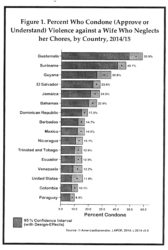Nearly 31% of Guyanese approve or understand violence against a wife who neglects her chores according to a 16-country survey by the Latin American Public Opinion Project (LAPOP).
This result came from the 2014/15 round of LAPOP’s AmericasBarometer survey. On average, one out of four individuals either approves or understands a man hitting his wife if chores are neglected. Of the countries surveyed, Guatemala had the highest percentage for tolerating violence against a wife at 53.9% while Paraguay had the lowest of 8.4%.
 LAPOP, run by US university Vanderbilt, conducts the AmericasBarometer survey every two years in what has been described as a scientifically rigorous comparative study. The survey measures values, behaviours, and socio-economic conditions in the Americas using national probability samples of voting-age adults.
LAPOP, run by US university Vanderbilt, conducts the AmericasBarometer survey every two years in what has been described as a scientifically rigorous comparative study. The survey measures values, behaviours, and socio-economic conditions in the Americas using national probability samples of voting-age adults.
Compared to Guyana’s 30.8%, Suriname’s tolerance of violence was the second highest at 43.7%. Jamaica registered 24.5%, The Bahamas 22.9%, Barbados 14.7% and Trinidad and Tobago 12.6%. The Guyana figure will be seen as further insight into the high levels of domestic violence here which has claimed dozens of lives in recent years.
Following an introduction, the question put to the respondents to the survey was as follows: `His wife neglects the household chores. Would you approve of the husband hitting his wife, or would you not approve but understand, or would you neither approve nor understand?’
The recently released findings in AmericasBarometer Insights: 2016, Number 127 said that the response rate to the question was 98.3%.
In her report on the findings, Lauren Pak said that the pervasiveness of partner violence (Bott et al.2013, WHO 2014) in the Americas is arguably fortified by norms that tolerate such abuse.
“In terms of individual predictors, tolerance varies across women (versus men), older generations (versus middle age and younger generations), and urban (versus rural) places of residence.
Those who are more educated and wealthier are less likely to express tolerance for spousal violence. Economic vulnerability matters: those in households experiencing more financial problems are more tolerant of spousal violence against wives. Finally, those who intend to migrate are more tolerant of domestic violence, suggesting that the links between economic, social, and other forms of hardship and dislocation may be quite robust and should be further examined to best understand this issue in the Americas”, the researcher found.
She said that policies and programmes that expand education, economic opportunities, and social stability are key to addressing norms with respect to tolerance for domestic violence.
She contended that these heightened efforts might be pursued together with more targeted programmes that seek to empower women while encouraging men to curb their comparatively higher degree of tolerance for domestic violence against women.









